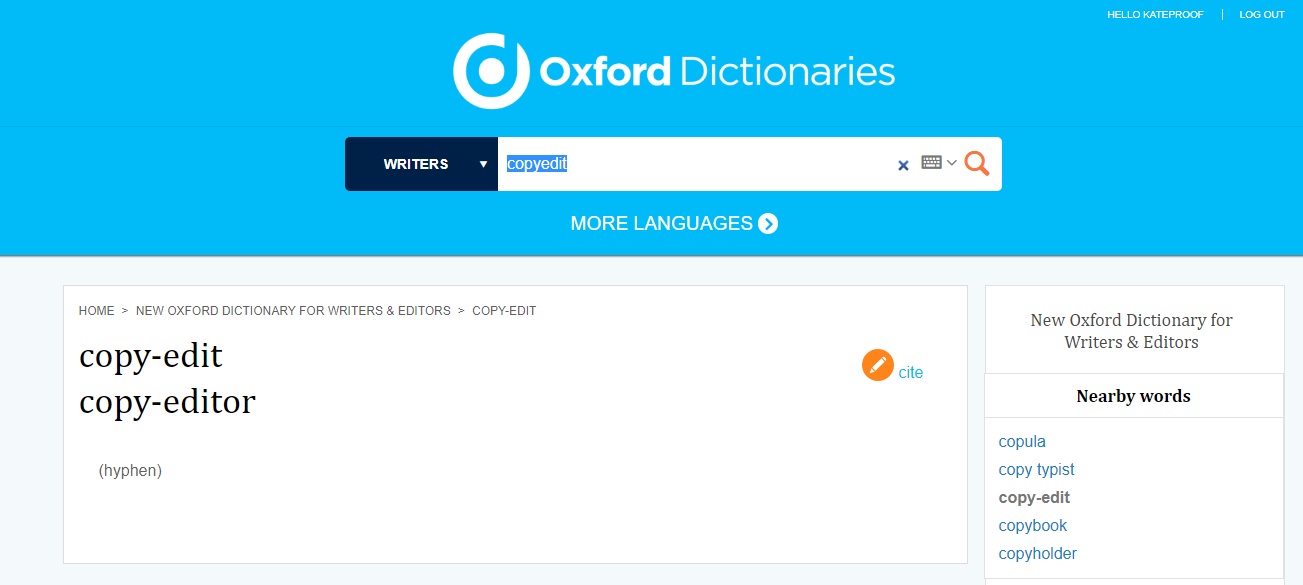Copyeditor, Copy-editor – The Evolution of Language
Posted on 6th June 2018; revised June 2022 due to broken external links
Lately my breaks are being filled with TED talks, mainly about language. It might not seem like obvious continual professional development (CPD) but I tell myself it counts while drinking a coffee and letting my eyes rest from more intense proofreading and editing work.
This talk by Lera Boroditsky really made me think about languages, especially in relation to working with non-native speakers. If I understand a little about where the author is coming from, I hope to be able to help retain the author's voice while ensuring it sounds 'native'. I love the idea of possessing a second soul if you speak a second language (HT: Charlemagne) and the way that language shapes how we think generally. Note to self: be more aware of my cardinal points!
But it was this TED talk by Anne Curzan about "What makes a word 'real'" that made me think I should write a quick blog post about these talks and language generally.
Anne's talk looks at how words get added to dictionaries, and she also touches on the issue of why we trust dictionaries but rarely look at who edits them and why words are included (or perhaps not).
When working on fiction in particular, I often find myself making comments along the lines of "I don't see this word in the dictionary but the meaning is clear so let's keep it", making the author aware that I have checked it and understood it, but not for one second suggesting they should change it. The same is true if an author uses a word differently from the dictionary definition: as long as I think it's clear for the reader, I won't suggest they change it. And even if it's not entirely clear to the reader, as long as the author is aware of this, I will let them make the final choice on whether to include it. This comes back to the same argument I use when authors break grammar rules: as long as the author knows they are breaking a rule/using a word differently from the norm, it's fine to play around and use language in this way.
It's also why consistency is so important in whatever text you're writing. A good example of this is the completely inconsistent approach to the word copy edit; let's face it, if a community of people who spend their days working with words can't agree how to write the word consistently, then it's easy to see why people can't decide on so many other variations, such as for hyphenation or single/double consonants.
I often use Oxford online as a dictionary, where they have copy-edit as the verb but copy editor as the noun. Through my paid-for subscription to this site, I also get access to the New Oxford Dictionary for Writers and Editors (NODWE), and you'd think that as both are part of the Oxford suite and accessed through the same platform, they would follow the same rule, but they don't: NODWE explicitly states that both take a hyphen, as copy-editor and copy-edit (as shown in the screenshot below as I realise not all readers will have access to this; word checked and screenshot taken on 31/05/2018).

This example shows not only that one spelling is not always considered the "right" or "wrong" one, but also that language changes and develops. As Anne so succinctly puts it, "dictionaries are fantastic resources, but they are human and they are not timeless" (04:31 in the above video).
I believe being open to language changes and not imposing likes/dislikes are pretty key attributes for an editor. If an author wants to hyphenate something that I prefer not to, as long as they are consistent in using the hyphen, I think it's fine. The same goes for spelling variations.
This also links in to the need for style guides, especially if a client is aiming for consistency across numerous documents and/or platforms, because it might be that the author doesn't want to refer to one dictionary alone and will therefore need a list of preferences for spellings and hyphenation.
As language develops, it's my desire to develop with it; as an Advanced Professional Member of the Society for Editors and Proofreaders, it's also my responsibility to keep abreast of changes and keep up with CPD.
Written by Kate Haigh.
